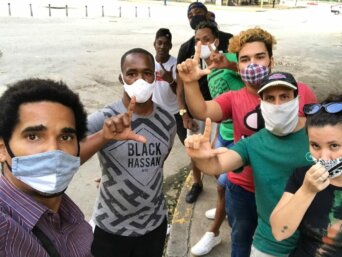- About
- Topics
- Picks
- Audio
- Story
- In-Depth
- Opinion
- News
- Donate
- Signup for our newsletterOur Editors' Best Picks.Send
Read, Debate: Engage.
| topic: | Arts |
|---|---|
| located: | Cuba |
| editor: | Ellen Nemitz |
The arrest and conviction of the Cuban artist Denis Solís – self-described human rights' activist and opponent to the Castro’s regime – sparked a long series of protests, hunger and thirst strikes (according to journalist Abraham Jiménez Enoa, authorities prevented supplies from being received) and repression in Havana, with several demonstrators and supporters detained. Solís was arrested on November 9 and, just two days later, was trialled and sentenced to eight months in prison for contempt, according to Amnesty International.
The first act of resistance was convened three weeks ago by the San Isidro Movement, which gathers artists, journalists and other activists “to promote, protect and defend freedom of expression, association, creation and diffusion of arts and culture in Cuba” – it was created in 2019 to "empower the society toward a future with democratic values," right after the Decree 349 centralised artistic creation under the Ministry of Culture’s control.
Under hashtags like #TodosSomosSanIsidro (We are all San Isidro, in English) and #FreeDenis – among others regarding people detained or missing – the movement went far and beyond the Cuban borders. Artists, activists and even politicians from abroad are now supporting it, such as the deputy Alejandra Lordén, from Argentina, the Assistant Secretary of US Department of State, Michael Kozak, and Secretary of State Mike Pompeo, who tweeted: "We urge the Cuban regime to cease harassment of San Isidro Movement protestors and to release musician Denis Solís, who was unjustly sentenced to eight months in prison. Freedom of expression is a human right.” Journalist and author Michael Deibert also recorded a video to show his support: “San Isidro Movement is not isolated. The world and all free people are looking at and supporting this fight,” he said, in Spanish.
Amnesty International says the imprisonment of Denis Solís is against international human rights laws and demanded his immediate release. It's important to note that this is not the first time that the institution interfered to release prisoners of conscience in Cuba, the only country in the Americas which prohibits Amnesty International from visiting. “These activists might be irreverent, they might be criticizing the authorities in a way that is uncomfortable for them, and they have generated huge international attention this week with their peaceful activism and use of social media, but what kind of state tries to crush ideas by ruthlessly robbing people of their right to free expression?”, asked Erika Guevara-Rosas, Americas director at Amnesty International, in a text asking for freedom for other members of San Isidro.
San Isidro has claimed attention – at the cost of life and security of its own members – for long-term repression perpetrated by the government of Cuba. The courage to ask for change and for freedom of expression is one of the basic principles of the Human Rights Declaration. Despite all difficulties of the current situation, the Declaration is the path to a democracy we must defend everyday, everywhere. As described by journalist Abraham Jiménez, this situation“made a considerable mass of people claim for the first time and in unison on social media the words: change, dialogue.”
Image by The Movimiento San Isidro, Facebook

